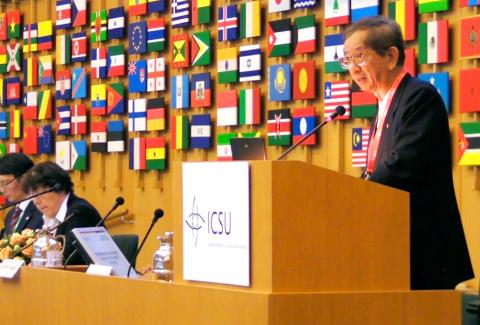|
Lee Yuan-tseh heads
international science council
DEVELOPMENT: The goal of science and technology
is to create a better world ¡X and not just financial gain, the Taiwanese Nobel
laureate said in his acceptance speech
Staff Writer, with CNA, ROME

Nobel laureate Lee Yuan-tseh
delivers his acceptance speech as he assumes the presidency of the International
Council for Science in Rome on Friday.
Photo: CNA
Chemistry Nobel laureate Lee Yuan-tseh
(§õ»·õ) assumed the presidency of the International Council for Science on Friday,
becoming the first Taiwanese academic to take up a leadership post at the
international scientific body.
A former president of Academia Sinica, Taiwan¡¦s leading research institution,
Lee is to serve a three-year term as president of the council, a
non-governmental organization billed as the ¡§UN of science.¡¨
Speaking to 300 delegates at the council¡¦s general assembly in Rome, Lee urged
the world to tap the wisdom of ancient civilizations for solutions to rampant
development and pollution.
Excessive human activity has put the environment in peril, Lee said, reminding
his audience that the ultimate goal of science and technology was to create a
better world and not just financial gain.
Lee will be pushing several major scientific projects during his three-year term
and will be responsible for planning a scientific department for the UN
Conference on Sustainable Development in Rio de Janeiro next year.
He was elected council president at the last general assembly in Mozambique in
2008.
Academia Sinica president Wong Chi-huey (¯Î±Ò´f) said in Rome that Lee¡¦s position
as council president would be beneficial to Taiwan and that it would also
greatly encourage young scientists in the country.
Chou Chang-hung (©P©÷¥°), a researcher at the institution who was also in Rome for
the council¡¦s general assembly, said he expected that Lee¡¦s appointment would
elevate Taiwan¡¦s presence in the international community.
The mission of the council, founded in 1931, is to facilitate international
cooperation in the advancement of science and to improve the well-being of
humans.
Its members include 121 national scientific bodies and 30 international
scientific unions.
|
![]()
![]()
![]()